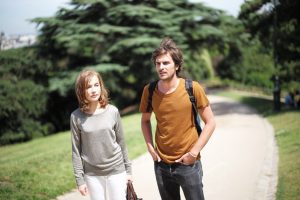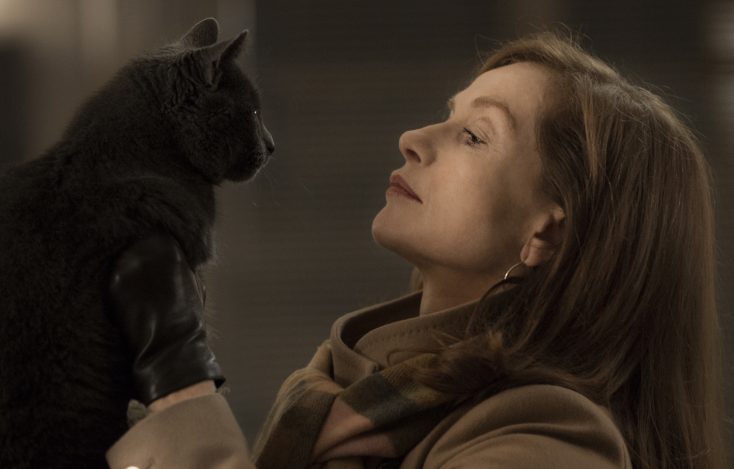
Nathalie (Isabelle Huppert) and former student Fabien (Roman Kolinka) exchange philosophical ideas in THINGS TO COME. CR: IFC Films/L. Bergery
By ANGELA DAWSON
Front Row Features
HOLLYWOOD—This holiday season, prepare for a French treat that is actress Isabelle Huppert. She appears in two French-language films, “Elle” and “Things to Come,” playing two very different women whose lives are in transition.
In “Elle,” Huppert plays a successful business owner who is raped in her home, but the French actress says the woman she plays is not a victim, despite the brutal assault her character endures. Instead, Michelle (or Elle) resolutely tracks down her assailant and the two are drawn into a strange and thrilling game that could spiral out of control.
As the title character in the Paul Verhoeven-directed dark comedy (yes, comedy), she is a complex and somewhat damaged person, who has deep-seated issues with her elderly mother, simple-minded adult son and her late father, who was a serial killer.
The highly acclaimed French actress is no stranger to playing distinctive, not always likable but certainly captivating, women on screen. Just don’t call them characters, at least not to Huppert’s face.
“A ‘character’ is very arbitrary; it gives you limitations,” she insists during an interview. “ It’s not the way I approach my work. I think in terms of states of mind. For me, a character does not exist. It’s not like I become the character. It’s more like the character becomes me.”
In the Mia Hansen Love-directed drama “Things to Come” (opening in New York and L.A. Friday, Dec. 2, and gradually rolling out), Huppert plays a philosophy teacher whose idyllic life is upended when her husband of more than 20 years, also a philosophy teacher, reveals that he is leaving her for another woman. Nathalie’s woes mount as her aging and demanding mother resists going to a nursing home and grown children leave the nest. Additionally, her publishers inform her that sales of her philosophy books have tanked and they are not going renew her contract unless she agrees to jazz them up. For the first time, Nathalie is “free,” and discovers she has to reinvent her life. She starts visiting a country farmhouse where a former student has set up a kind of an anarchist think tank with some his young friends. Nathalie’s last connection to her past is a pesky black cat previously owned by her mother. Slowly but surely, she begins to make the transition to the next phase of her life.
With a career in film that spans four decades, Huppert has worked with some of the most renowned international filmmakers including Jean-Luc Godard, Otto Preminger, Michael Haneke, Olivier Assayas, Francois Ozon and Claude Chabrol, who cast her in three of his films including 1991’s adaptation of “Madame Bovary.”
Looking elegant in a colorful green, black and white jacket over a black top and skirt ensemble, titian-haired Huppert spoke about tackling the role of Elle (short for Michelle) in David Birke’s adaptation of Philippe Djian’s novel “Oh…”
Q: You really allow yourself to “go there” in your roles. Is that difficult?
Huppert: No. I don’t see any problems “going there.” For me, it’s easier to go there than to take simpler characters and stories. I think it’s a lot easier to do characters like this with complexity, ambiguity. The camera allows you to say so many contradictory things at the same time.
I like it when a character plunges into the most complex and debatable situations and yet you have the possibility to end up with an idea of how innocent and fragile he or she is, even Michelle at the end. She got rid of so many things during the course of the story. All the initial tragedy that she carries from her childhood explains how she relates to violence. Not everyone who had been through what she does would react in the same way.
I might react the same way, “It’s not a big deal,” and that’s the way she reacts to what happens to her. Obviously, it is a big deal what happens to her (the rape). But that story, in particular, can be taken as a fantasy, as a fairy tale, a dark fairy tale, and it’s also realistic. That’s how disturbing the film is. The way she reacts to that event has to be understood or to be guessed. That’s what I like about the film; you can only guess what happens to her. You can only guess what took her from the initial tragedy that she had to carry all her life to the woman she is: being fearless, strong, solitary, ruthless, manipulative but still fragile. I love the way she takes care of the injured bird, for example. It’s really interesting.
Throughout “Elle,” there are these little moments that show her complexity: she hates her mother but she also loves her, she doesn’t think much of her son but she still loves him. That’s the way you relate to people most of the time. You can have negative feelings for people but still love them. That’s very human.
Q: How was it working with director Paul Verhoeven on ‘Elle?”
Huppert: I’ve always admired him immensely. The first film I saw by him was (1973’s) “Turkish Delight.” I was still in school when I saw that film and it has stayed with me for a long time. I like the way he blends different kinds of film genres. With this film, it goes from a Hitchcock-type thriller to the psychological portrait of a woman, and there are comedic elements to it. He makes people feel off-balance because he takes you everywhere. It’s almost like a roller coaster but with a beautiful view. (She laughs.) He seems to be ironic and not to care, but he actually cares a lot. Even if you take a film like “Black Book” in which a Jewish girl sleeps with a Nazi, he forces you to look at people the way they are and not who they pretend to be in fiction.
Q: Didn’t Philippe Djian, the author of “Oh…,” the book that “Elle” is based on, tell you he wrote the main character with you in mind?
Huppert: That’s what he said when I met Philippe Djian about adapting the book into a film because I wanted to get involved in the production of the film. Finally we went to Michel Merkt, a French producer, who had the genius of asking Verhoeven to direct the film. And he told me he had me in mind when he was writing the novel.
Q: What did you think of that? Did you feel a certain responsibility because of that?
Huppert: No. I just thought he was inspired by some of the characters I’ve played before. I don’t think he meant he was inspired by me personally but the previous characters I’d played before. I didn’t feel responsible or not; I just thought good.
Q: Philippe Djian and the screenwriter, David Birke, are both men. Do you feel you brought a feminine perspective to the role?
Huppert: I read somewhere that Elle could be interpreted as a post-feminist character. I like that definition of her. Obviously, she’s not a victim so because of that she’s a feminist character but she doesn’t fall into the category of avenger. She’s beyond that. She doesn’t have to go through all these devices. She has the inner strength to be more than a feminist character.
She wants to understand something about violence and her willingness to understand it makes her stronger than the violence itself. That’s how she remains untouched by it.
Q: Is Nathalie, your character in “Things to Come,” more fragile?
Huppert: She could be a victim too. She’s being left by her husband and her children have left the house and her professional life isn’t any better because her publisher wants to put her aside. But it’s all about how stable she stays and how strong she stays and how she finds her inner resources to be happy. She’s a philosophy teacher and she finds fulfillment in her inner life. I like the way philosophy is shown in the film. I don’t know if you’ve seen the film yet but philosophy’s never shown as something abstract. It’s used as a tool to understand the world and see the world. It’s even funny because when she and her husband separate, they talk about the books of philosophers rather than other material things like the coffee machine. It’s nice.
Q: Many actresses complain there are not enough good roles for women. Do you find you’re getting a lot of good scripts?
Huppert: Any actor’s life, the good stuff is so rare. You’re not sitting on top of 50 masterpieces. You have one good thing that comes along and you take it.
Q: How do you know if you want to do it?
Huppert: I don’t know necessarily from the beginning. Every one is a different situation. If it’s an established director like Michael Haneke (“Amour”) and Paul Verhoeven, the script is secondary. With a first time director, it’s more about intuition and instinct. You tend to rely more on the part itself. It’s more difficult to make good choices with first time directors. But I think I did the good ones over the years. I did a (2008) film called “Home” with this Swiss-French director Ursula Meier. That was her first film and she’s turned out to be a major director.
Q: There has been some awards buzz around “Elle.”
Huppert: Yes, it’s the official entry (for best foreign language film) from France. I hope something will happen for Paul Verhoeven.
Q: And possibly for you.
Huppert: It’s not for me to say.
Q: In “Elle,” you are in almost every scene in the film except for the flashbacks. I imagine you had very long days during production.
Huppert: No, it’s me in the flashback. (She laughs.) The shoot was so great because I was in every frame and every shot nearly. Every day I was (on set) and it was so thrilling because it meant I didn’t have to make a choice, in a way. Sometimes, when you just have a few scenes, it’s more difficult to be that ambiguous and complex. But here it was almost like a documentary and Verhoeven never said a word to me. We never discussed character, not a word. We discussed the clothes and shoes, which are fabulous in the film. She’s wealthy and well dressed. But as for the character itself, we never discussed it. It was wonderful. He said she’s a woman and she knows more than I would do and he let me take the material and shape it the way I wanted. it. That was an extraordinary experience. I never felt like I was playing a character and rarely I do.
You absorb the director’s vision. You are defined by the way you are filmed by the director. The camera comes at the right moment, the right movement. It’s all about this during the movie. The rest is unimportant, honestly.
Q: What are you working on?
Huppert: I just finished shooting a film called “Madame Hyde.” It’s a crazy female version of “Doctor Jekyll and Mr. Hyde.” I play this crazy math teacher who becomes Mrs. Hyde at night. It’s directed by French director Serge Bozon, with whom I did another film called “Tip Top” two years ago. Hopefully, it will be released (in the U.S.) because it’s a really interesting film. This character was completely composed. So it was about being composed and yet very true. Even when you compose a character, it has to be very real. That’s how people relate to what you are. There’s a strange balance between being composed and very true.





